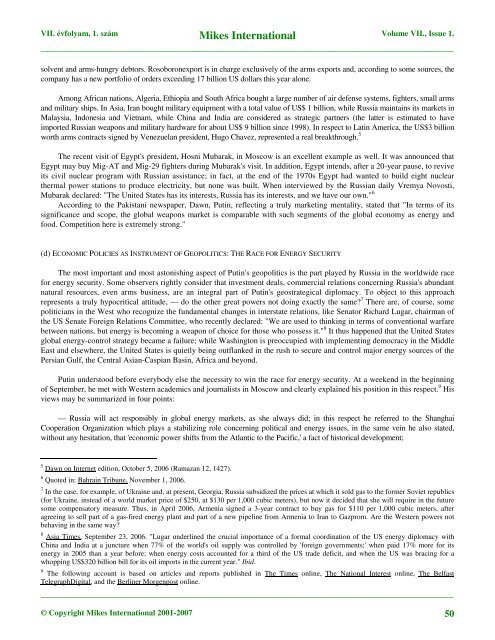Mikes International - Hollandiai Magyar Szövetség
Mikes International - Hollandiai Magyar Szövetség
Mikes International - Hollandiai Magyar Szövetség
Create successful ePaper yourself
Turn your PDF publications into a flip-book with our unique Google optimized e-Paper software.
VII. évfolyam, 1. szám <strong>Mikes</strong> <strong>International</strong> Volume VII., Issue 1.<br />
_____________________________________________________________________________________<br />
solvent and arms-hungry debtors. Rosoboronexport is in charge exclusively of the arms exports and, according to some sources, the<br />
company has a new portfolio of orders exceeding 17 billion US dollars this year alone.<br />
Among African nations, Algeria, Ethiopia and South Africa bought a large number of air defense systems, fighters, small arms<br />
and military ships. In Asia, Iran bought military equipment with a total value of US$ 1 billion, while Russia maintains its markets in<br />
Malaysia, Indonesia and Vietnam, while China and India are considered as strategic partners (the latter is estimated to have<br />
imported Russian weapons and military hardware for about US$ 9 billion since 1998). In respect to Latin America, the US$3 billion<br />
worth arms contracts signed by Venezuelan president, Hugo Chavez, represented a real breakthrough. 5<br />
The recent visit of Egypt's president, Hosni Mubarak, in Moscow is an excellent example as well. It was announced that<br />
Egypt may buy Mig-AT and Mig-29 fighters during Mubarak's visit. In addition, Egypt intends, after a 20-year pause, to revive<br />
its civil nuclear program with Russian assistance; in fact, at the end of the 1970s Egypt had wanted to build eight nuclear<br />
thermal power stations to produce electricity, but none was built. When interviewed by the Russian daily Vremya Novosti,<br />
Mubarak declared: "The United States has its interests, Russia has its interests, and we have our own." 6<br />
According to the Pakistani newspaper, Dawn, Putin, reflecting a truly marketing mentality, stated that "In terms of its<br />
significance and scope, the global weapons market is comparable with such segments of the global economy as energy and<br />
food. Competition here is extremely strong."<br />
(d) ECONOMIC POLICIES AS INSTRUMENT OF GEOPOLITICS: THE RACE FOR ENERGY SECURITY<br />
The most important and most astonishing aspect of Putin's geopolitics is the part played by Russia in the worldwide race<br />
for energy security. Some observers rightly consider that investment deals, commercial relations concerning Russia's abundant<br />
natural resources, even arms business, are an integral part of Putin's geostrategical diplomacy. To object to this approach<br />
represents a truly hypocritical attitude, — do the other great powers not doing exactly the same? 7 There are, of course, some<br />
politicians in the West who recognize the fundamental changes in interstate relations, like Senator Richard Lugar, chairman of<br />
the US Senate Foreign Relations Committee, who recently declared: "We are used to thinking in terms of conventional warfare<br />
between nations, but energy is becoming a weapon of choice for those who possess it." 8 It thus happened that the United States<br />
global energy-control strategy became a failure; while Washington is preoccupied with implementing democracy in the Middle<br />
East and elsewhere, the United States is quietly being outflanked in the rush to secure and control major energy sources of the<br />
Persian Gulf, the Central Asian-Caspian Basin, Africa and beyond.<br />
Putin understood before everybody else the necessity to win the race for energy security. At a weekend in the beginning<br />
of September, he met with Western academics and journalists in Moscow and clearly explained his position in this respect. 9 His<br />
views may be summarized in four points:<br />
— Russia will act responsibly in global energy markets, as she always did; in this respect he referred to the Shanghai<br />
Cooperation Organization which plays a stabilizing role concerning political and energy issues, in the same vein he also stated,<br />
without any hesitation, that 'economic power shifts from the Atlantic to the Pacific,' a fact of historical development;<br />
5 Dawn on Internet edition, October 5, 2006 (Ramazan 12, 1427).<br />
6 Quoted in: Bahrain Tribune, November 1, 2006.<br />
7 In the case, for example, of Ukraine and, at present, Georgia, Russia subsidized the prices at which it sold gas to the former Soviet republics<br />
(for Ukraine, instead of a world market price of $250, at $130 per 1,000 cubic meters), but now it decided that she will require in the future<br />
some compensatory measure. Thus, in April 2006, Armenia signed a 3-year contract to buy gas for $110 per 1,000 cubic meters, after<br />
agreeing to sell part of a gas-fired energy plant and part of a new pipeline from Armenia to Iran to Gazprom. Are the Western powers not<br />
behaving in the same way?<br />
8 Asia Times, September 23, 2006. "Lugar underlined the crucial importance of a formal coordination of the US energy diplomacy with<br />
China and India at a juncture when 77% of the world's oil supply was controlled by 'foreign governments;' when paid 17% more for its<br />
energy in 2005 than a year before; when energy costs accounted for a third of the US trade deficit, and when the US was bracing for a<br />
whopping US$320 billion bill for its oil imports in the current year." Ibid.<br />
9 The following account is based on articles and reports published in The Times online, The National Interest online, The Belfast<br />
TelegraphDigital, and the Berliner Morgenpost online.<br />
_____________________________________________________________________________________<br />
© Copyright <strong>Mikes</strong> <strong>International</strong> 2001-2007 50

















